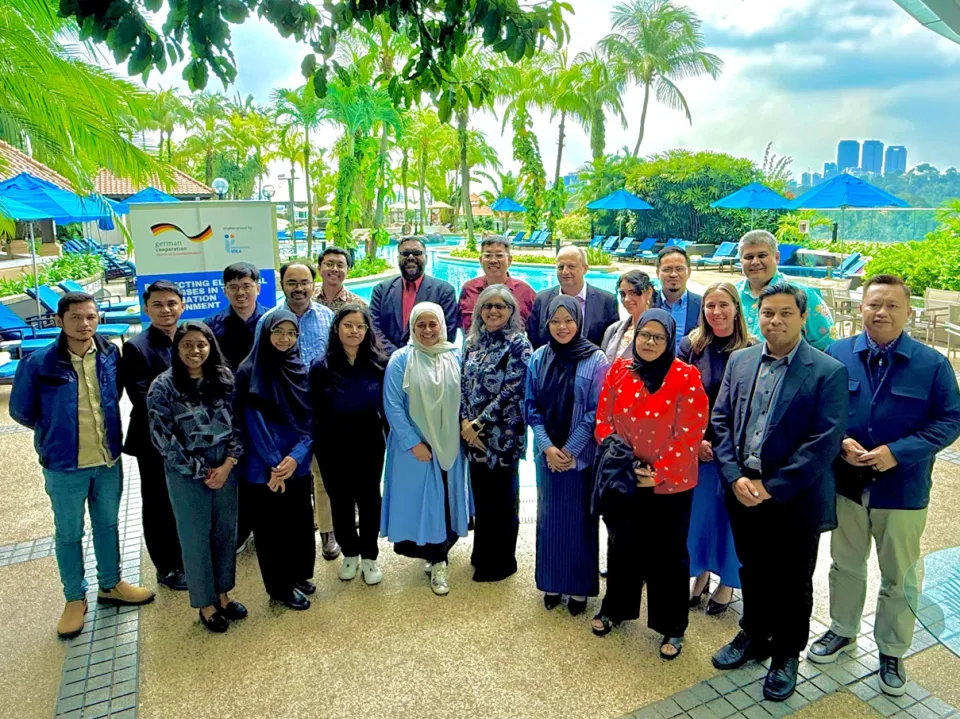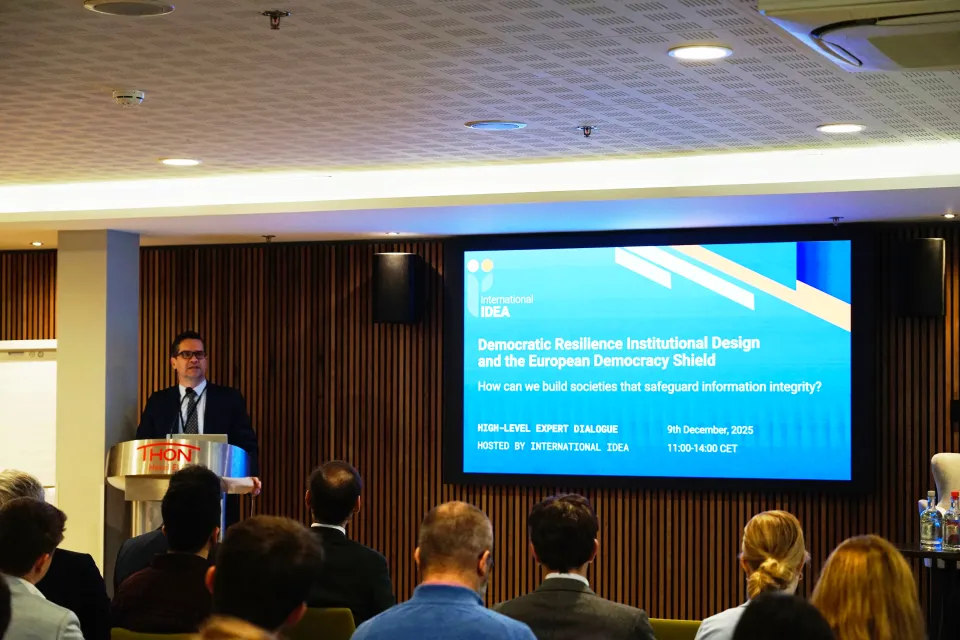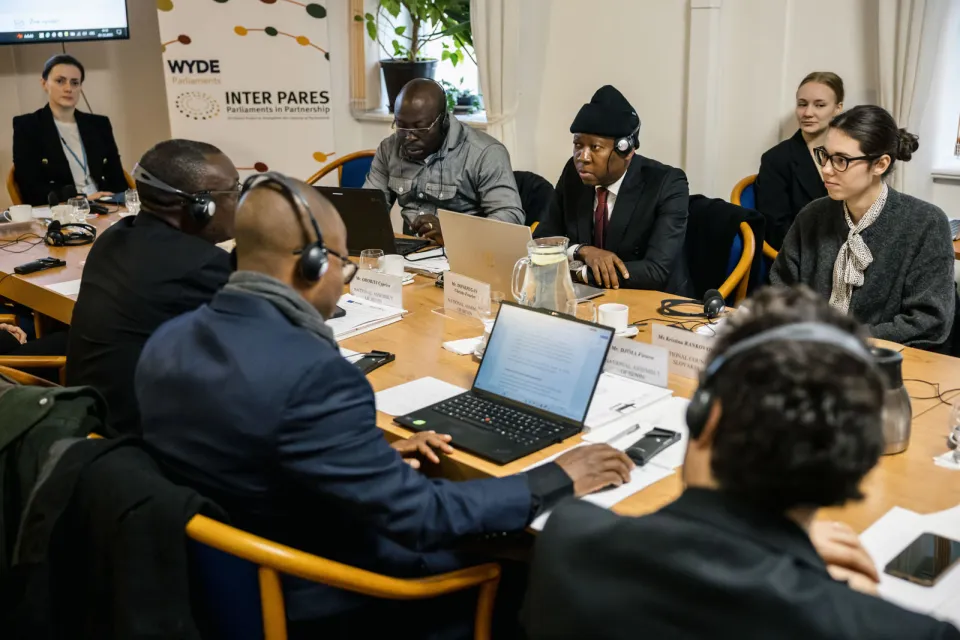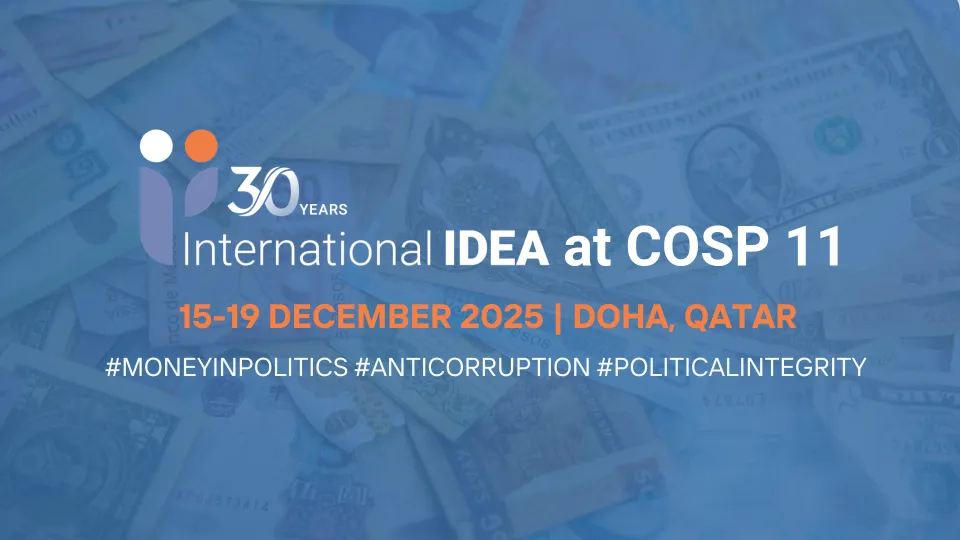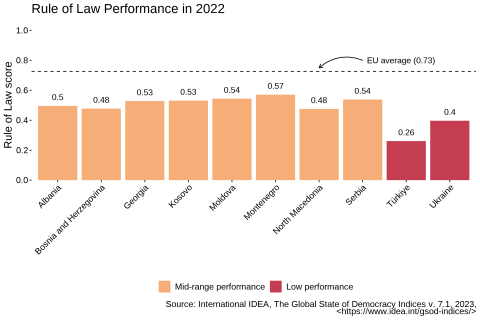
A snapshot of democracy in the 2023 enlargement reports

Disclaimer: Opinions expressed in this commentary are those of the author and do not necessarily represent the institutional position of International IDEA, its Board of Advisers or its Council of Member States.
Fundamentals and EU enlargement
The Enlargement Reports are a traditional hallmark event for EU accession policy, and this year the reports are even more impactful with increased attention on EU enlargement following the outbreak of Russia’s war in Ukraine in 2022. As Commission President Ursula Von der Leyen mentioned upon releasing the reports: “In times where we see the rules-based international order increasingly called into question, of course a larger and stronger European Union gives us a stronger voice in the world.”
The introduction of the EU’s new enlargement methodology in 2022 made fundamental values such as democracy, human rights and the rule of law more prominent, now functioning as gatekeepers before progress on other reforms can be considered. International IDEA’s 2023 Global State of Democracy report measures the ten enlargement countries among similar categories (Representation, Rule of Law, Participation, and Rights), as shown in the below graphs. With democracy under pressure both in Europe and across the world, ensuring that EU integration enhances lasting democratic progress is an increasingly pertinent priority.

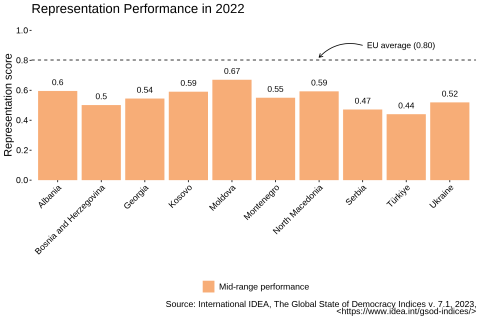
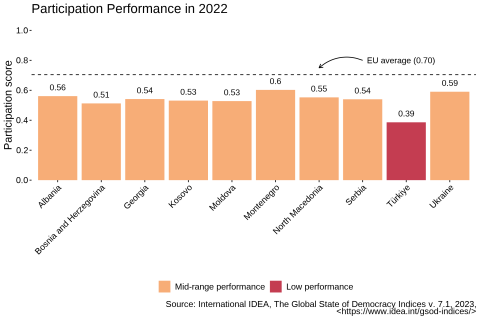
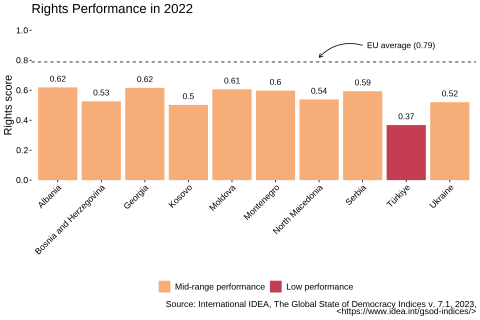
Many consider EU enlargement as the single strongest incentive for democratic progress on the continent over the past decades. Indeed, the first paragraph of the accompanying Communication to the Reports mentions that enlargement “is a powerful tool to promote democracy, the rule of law and respect for fundamental rights”. Recent democratic regression in Hungary, Poland and Slovakia, however, has made it clear that reversal of such progress is possible. Therefore, democratic reforms are not just to be taken seriously during the accession phase but need also to be future-proofed for the period following accession. President Von der Leyen alluded to that blurring line in rule of law procedures, before and after joining, when in her State of the European Union speech she opened the EU’s internal Rule of Law Reports also to accession countries.
Discussions on enlargement have recently juxtaposed political versus merit-based incentives for accession. While some emphasise the political imperative that geopolitical threats such as the war in Ukraine bring about for enlargement, others warn against expanding too hastily, arguing that regardless of political realities, accession can only happen once EU standards are met. For example, MEP Sanchez Amor echoed this sentiment in his reaction to the release, “We have to focus on values, and not be driven by geopolitical needs.” In light of these discussions and increasing threats to democracy globally, it is important to put the spotlight on how the reports evaluate democratic progress.
Five key take-aways for democracy
When assessing the Enlargement Reports, five main take-aways for democracy stand out: the increased accession potential offered to certain countries; progress on anti-corruption and the justice sector; the introduction of financial conditionality on values; the link between foreign policy and values; and the relation between digital developments and democracy.
First, the perspective offered: the most significant take-away seems to be the greater prospects for accession than in previous years. Not only noteworthy is the opening of accession negotiations for Moldova and Ukraine, but also the conditional opening of accession negotiations with Bosnia and Herzegovina and the conditional candidate status for Georgia. Given the increased priority of democracy, the rule of law and human rights in accession criteria, it is important to consider the extent to which these countries indeed progressed in these aspects.
Ukraine and Moldova have demonstrated progress in these areas. The Commission reports that Ukraine has fulfilled 90 per cent of the necessary steps from last year’s report, especially regarding anti-corruption and judicial independence. Moldova has made similar progress, with the Commission noting that it “sufficiently fulfils the criteria related to the stability of institutions guaranteeing democracy, the rule of law, human rights.” The 2023 Edition of International IDEA’s Global State of Democracy (GSoD) Report comes to similar conclusions, observing an uptake in especially anti-corruption in both countries.
The progress marked for Georgia and Bosnia and Herzegovina is less clear: both countries were given advancement of their accession processes, despite the ongoing concerns noted in the reports.
For Georgia, the report highlights the tense political polarisation and the need for more positive engagement by the ruling party with opposition parties and civil society. It presents a total of nine action points, including on fundamental democratic requirements, such as improving electoral integrity and the independence of the electoral commission, holistic reforms of justice institutions, including the High Council of Justice and Prosecutor’s Office, and increasing the independence of the Anti-Corruption Bureau. Yet, the Commission recommends that Georgia receives candidate status, conditional on progress towards these action points.
For Bosnia and Herzegovina, the report is less pronounced on fundamental values, although it does reference recent amendments of the High Judicial and Prosecutorial Council. The 2023 Edition of the GSoD and Freedom House's Freedom in the World indicate that electoral integrity has declined over the past decade, which is less addressed in the Report. Much of the Commission’s concerns instead centre on declining democratic values in Republika Srpska. The report criticizes unconstitutional behaviour by the entity’s leadership and restrictions on freedom of expression and media freedom, and warns against a draft law targeting civil society groups as ‘foreign agents’. Despite these concerns, the Commission recommends opening accession negotiations, conditional on greater compliance with membership criteria.
While the assessments for Bosnia and Herzegovina and Georgia seem accurate, the conclusion of opening accession talks with the former and granting candidate status with conditions to the latter is further reaching than some expected. Both countries fulfil an important geopolitical role, given their strategic position amid tensions in the region. In Bosnia and Herzegovina, the Commission stressed the increased potential for reforms following the arrival of a new government earlier this year. Both assessments therefore demonstrate the precarious balance between prioritising political and merit-based imperatives for opening accession talks.
The second finding concerns the remarkable progress in the areas of anti-corruption and justice reform. Georgia, Moldova and Ukraine have all made notable steps on anti-corruption, while efforts on de-oligarchisation are equally praised. The improvement, however, seems less pronounced in the Western Balkans, although Albania is commended in its report for the proactive work of the special prosecutor on anti-corruption. These findings are confirmed with the 2023 Edition of the GSoD, which indicates improvements on anti-corruption in especially Moldova and Ukraine, but the effect is less pronounced in the Western Balkans. The 2023 Balkan Barometer indeed mentions corruption among the top three in citizen concerns. Positive reforms in the justice sector are highlighted in most notably Ukraine, Moldova and Albania, with each making progress on different aspects of their selection and vetting processes.
The third observation concerns financial conditionality, with a new EUR 6 billion Growth Plan for the Western Balkans announced along with the reports. The EU made sure to specify that “payment conditions will be linked to specific reforms related to fundamentals of the enlargement process, including the rule of law, democracy, the respect of human rights and fundamental freedoms.” With this, the Commission mirrors the conditionality of the Instrument for Pre-accession Assistance (IPA), and the rule of law conditionality used for Hungary and Poland through its Recovery and Resilience Facility (RRF), which it enhances it in its enlargement policy. This development signals that the Commission considers financial conditionality an increasingly effective tool, and could indicate greater linkages between financial support and democratic values in the future.
A fourth observation concerns the more explicit link between foreign policy and fundamental values. In its introduction, the accompanying Communication mentions that “alignment with the EU’s common foreign and security policy is a more significant signal than ever of shared values and strategic orientation in the new geopolitical context.” Indeed, several of those countries with progress on fundamental values also receive positive foreign policy assessments, such as Albania, Moldova and Ukraine. Conversely, Serbia and Georgia have been called upon to improve both their rule of law reforms and foreign policy alignment. The same applies to Türkiye, which according to the Commission is backsliding on fundamental rights and the rule of law, while it also urgently cautions its foreign policy direction. Yet, for countries such as Montenegro and North Macedonia, the report is more mixed, critically assessing values, but being more positive regarding foreign policy. This dynamic once again demonstrates the tension between geopolitical imperatives and merit-based progress, between which the Commission must balance.
The fifth takeaway concerns the focus on digitalisation featured in the reports. The Commission does discuss digital developments in relation to administration and hybrid threats, but the topic is less explicitly mentioned in relation to democracy and elections. The reports caution against disinformation and cyberattacks more generally, including for specific countries such as Georgia. However, the Commission could benefit from more explicitly linking digitalisation with fundamental values, emphasising the EU’s internal experience in these areas, including on preventing hacking in elections, regulating microtargeting and online political advertising, and the impact of artificial intelligence. The EU is at the global forefront of legislation in these areas and possesses the knowhow to both assess and assist with progress in its neighbourhood. By more strongly connecting digital developments and democracy, it would interlink values similarly to how it has created interdependence between fundamental values and economic investment or foreign policy.
Enlargement in the year ahead
Developments affecting democracy and the rule of law in the year ahead are first and foremost security related. The war in Ukraine will continue to determine both democratic resilience and the overall scope for enlargement in Eastern Europe and the Western Balkans. The future of the dialogue between Serbia and Kosovo is a second security threat that, in case of escalation, would affect democratic stability throughout the region.
Milestones for democracy in the year ahead will be the December 2023 elections in Serbia, and upcoming elections in 2024 in Georgia, North Macedonia and Moldova. Both Serbia and Georgia have been criticized for their track records in democracy and the rule of law, as well as their ambivalent stance toward Russia. Elections will determine the reversal or entrenchment of that trend, with the recent electoral results in Poland demonstrating a path for pushing back against illiberal forces. Conversely, elections in Moldova and North Macedonia will test voter support for the pro-European and reform minded course by incumbent governments. Of course, the outcome of the European elections in June 2024 will fundamentally affect the EU’s appetite for enlargement.
These regional developments will continue to add a (geo)political layer to enlargement discussions and accentuate the existing tension between political and merit-based incentives in the accession process. As the two incentives are increasingly codependent, they will become further intertwined with enlargement criteria, with the linkages between fundamental values and areas such as foreign policy and financial assistance also likely to grow. There is also increased space to link other key areas to democracy and elections, such as digital progress. Whether amidst such increased interdependence democracy and rule of law will continue to function as gatekeeper to enlargement or suffer from the increased importance of more (geo)political considerations will be its litmus test. Ultimately, the enlargement countries will have to do their part to deliver on reforms and match the geopolitical with merits. As President Von der Leyen mentioned upon releasing the reports, it is the combined elements of geography, history and common values that bind us.
Sincere thanks to Blerta Hoxha, Nana Kalandadze, Vera Pachta, Gentiana Gola, Emily Bloom, Anna Schleiter-Nielsen and Thijs Heinmaa for their substantive input and review.

